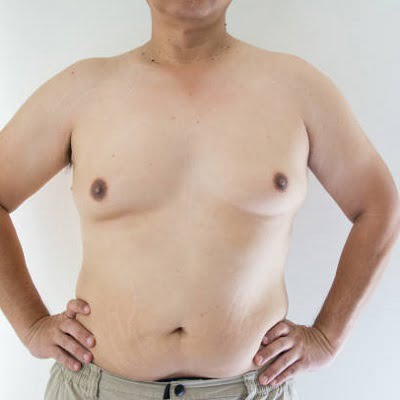
Male bodies habitually make a hormone known as testosterone, which monitors their sexual growth during the teenage years. But males too make some estrogen which is a hormone that directs sexual growth in females.
When a male is going through his teenage period, or when an older male’s body produces less testosterone, the balance of the two hormones fluctuates. When this situation arises, a higher percentage of estrogen becomes the cause of male breast tissue to swell. Nearly half of teenage boys and as many as two-thirds of men older than 50 are having Gynecomastia to some extent.
Gynecomastia Symptoms:
The first and early signs of Gynecomastia may well be a bump of fatty tissue below the nipple. This might be worrying for you and you tend to think that you have breast cancer. But Gynecomastia is not certainly a sign of cancer and in order to properly diagnose the exact cause, your doctor may advise you to have some lab tests to rule it out.
Sometimes the swelling of the breasts is uneven, with one becoming larger than the other. You may also feel tenderness in your breast.
See your doctor if you experience that your breasts have swelling, are painful or tender, or there is expulsion from the nipple of one or both breasts.
Gynecomastia Causes:
A lot of things can contribute to the hormone imbalance which results in male breast growth, and most of the time the exact cause is not identified. In addition to the variations in the body such as youth and mature, some things that can cause Gynecomastia are:
- An injury or diseases that affect the testicles, which produce testosterone
- Thyroid problems
- Cancers, including tumors of the lungs and pituitary gland
- over-weight
- Illegal Drugs,
- Kidney failure
- Liver disease
Some Types of Medicines Can Also Be a Cause of Gynecomastia:
- Anti-androgens
- Anabolic steroids and androgens
- HIV drugs
- Anti-anxiety drugs
- Heart medications
- Medicines used to empty your stomach
- Ulcer drugs
Gynecomastia Diagnosis:
If your doctor doubts that you have Gynecomastia, then he will most likely examine you just to make sure there are no hard lumps, discharge fluid, or any skin problem that may well be a sign of cancer. The doctor will also gather the details about your medical history.
You might also be asked to go for some laboratory tests. They could include:
- Blood tests or urine samples
- Mammogram
- Biopsy
- CT scans
- MRI scans
- Testicular ultrasounds
Gynecomastia Treatment:
When your doctor concludes that you have Gynecomastia, then he will refer you to an endocrinologist, who looks after the problems related to hormones. How you will be treated is dependent on depending on your age, your health, and how well you respond to certain medications.
- If Gynecomastia occurs during the teenage years, it commonly goes away naturally without any medication. However, this might take 6 months to 3 years.
- If it turns out your hormones imbalance because of another underlying health problem, then you will have to treat that condition as well.
- You might be prescribed a medication that is used to address the hormone imbalance which is causing breast growth.
In some cases, you will require surgery. Your doctor may recommend some surgical techniques, such as:
Liposuction: that is used to remove extra breast fat
Mastectomy: that is used to remove breast gland tissue
Gynecomastia Prevention:
There are certain ways through which you can lower your chances of having Gynecomastia. They are:
- Don’t use banned drugs, which include anabolic steroids, androgens, amphetamines, marijuana, or heroin.
- Do not consume alcohol
- Discuss your medications with your doctor in detail. If any of your medications can cause Gynecomastia, change that medicine, and ask for the alternatives.
Effects of Gynecomastia on Looks and Overall Health:
For most of the men, the effects of Gynecomastia on looks and overall health can be traumatic and embarrassing. Gynecomastia can be hard to hide and a challenge to romantic affiliations. Irrespective of your age, you may feel like your body has let down you and you may feel unhappy with yourself. These feelings are quite normal, but you can cope up with these feelings through the following means:
- Get counseling: Talk therapy can help you avoid adverse Effects of Gynecomastia on Looks and Your Overall Health. It can also help you to communicate with your partner or family members so that they understand your emotions and feelings.
- Seek help from your close relationships. You may possibly feel embarrassed to talk about Gynecomastia with them but explaining your situation and asking for support will possibly strengthen your relationships and also help you to reduce stress.
- Connect with other people who have Gynecomastia. Communicating with those men can help you to cope with negative feelings.



